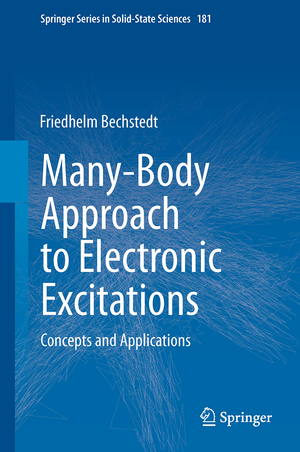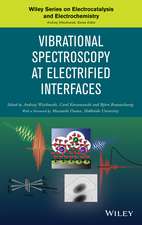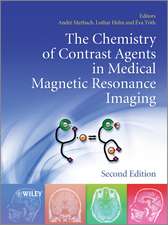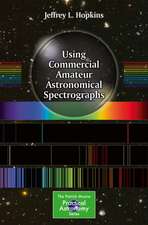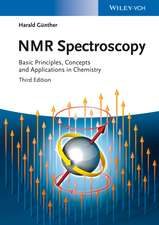Many-Body Approach to Electronic Excitations: Concepts and Applications: Springer Series in Solid-State Sciences, cartea 181
Autor Friedhelm Bechstedten Limba Engleză Hardback – 12 dec 2014
| Toate formatele și edițiile | Preț | Express |
|---|---|---|
| Paperback (1) | 1231.95 lei 6-8 săpt. | |
| Springer Berlin, Heidelberg – 23 aug 2016 | 1231.95 lei 6-8 săpt. | |
| Hardback (1) | 1238.23 lei 6-8 săpt. | |
| Springer Berlin, Heidelberg – 12 dec 2014 | 1238.23 lei 6-8 săpt. |
Din seria Springer Series in Solid-State Sciences
- 18%
 Preț: 1225.94 lei
Preț: 1225.94 lei -
 Preț: 642.45 lei
Preț: 642.45 lei - 18%
 Preț: 1017.62 lei
Preț: 1017.62 lei - 15%
 Preț: 532.05 lei
Preț: 532.05 lei -
 Preț: 541.46 lei
Preț: 541.46 lei - 18%
 Preț: 962.35 lei
Preț: 962.35 lei -
 Preț: 385.84 lei
Preț: 385.84 lei - 18%
 Preț: 1827.48 lei
Preț: 1827.48 lei - 15%
 Preț: 661.02 lei
Preț: 661.02 lei -
 Preț: 389.88 lei
Preț: 389.88 lei - 15%
 Preț: 639.59 lei
Preț: 639.59 lei - 15%
 Preț: 635.15 lei
Preț: 635.15 lei - 18%
 Preț: 896.21 lei
Preț: 896.21 lei - 15%
 Preț: 647.92 lei
Preț: 647.92 lei - 15%
 Preț: 651.34 lei
Preț: 651.34 lei - 18%
 Preț: 890.23 lei
Preț: 890.23 lei - 15%
 Preț: 640.55 lei
Preț: 640.55 lei - 15%
 Preț: 649.54 lei
Preț: 649.54 lei - 15%
 Preț: 645.60 lei
Preț: 645.60 lei - 15%
 Preț: 644.30 lei
Preț: 644.30 lei - 15%
 Preț: 653.79 lei
Preț: 653.79 lei - 18%
 Preț: 956.69 lei
Preț: 956.69 lei - 15%
 Preț: 637.59 lei
Preț: 637.59 lei - 23%
 Preț: 1043.41 lei
Preț: 1043.41 lei - 15%
 Preț: 639.08 lei
Preț: 639.08 lei - 15%
 Preț: 648.24 lei
Preț: 648.24 lei - 15%
 Preț: 637.46 lei
Preț: 637.46 lei - 15%
 Preț: 640.06 lei
Preț: 640.06 lei -
 Preț: 391.40 lei
Preț: 391.40 lei -
 Preț: 390.84 lei
Preț: 390.84 lei - 15%
 Preț: 638.57 lei
Preț: 638.57 lei - 18%
 Preț: 1006.06 lei
Preț: 1006.06 lei - 18%
 Preț: 730.79 lei
Preț: 730.79 lei - 15%
 Preț: 640.37 lei
Preț: 640.37 lei - 15%
 Preț: 643.65 lei
Preț: 643.65 lei - 18%
 Preț: 1231.01 lei
Preț: 1231.01 lei - 18%
 Preț: 950.21 lei
Preț: 950.21 lei - 15%
 Preț: 642.68 lei
Preț: 642.68 lei - 15%
 Preț: 640.55 lei
Preț: 640.55 lei - 18%
 Preț: 1229.10 lei
Preț: 1229.10 lei
Preț: 1238.23 lei
Preț vechi: 1510.05 lei
-18% Nou
Puncte Express: 1857
Preț estimativ în valută:
236.98€ • 246.75$ • 200.27£
236.98€ • 246.75$ • 200.27£
Carte tipărită la comandă
Livrare economică 10-24 martie
Preluare comenzi: 021 569.72.76
Specificații
ISBN-13: 9783662445921
ISBN-10: 3662445921
Pagini: 600
Ilustrații: XXXI, 584 p. 235 illus., 193 illus. in color.
Dimensiuni: 155 x 235 x 38 mm
Greutate: 1.03 kg
Ediția:2015
Editura: Springer Berlin, Heidelberg
Colecția Springer
Seria Springer Series in Solid-State Sciences
Locul publicării:Berlin, Heidelberg, Germany
ISBN-10: 3662445921
Pagini: 600
Ilustrații: XXXI, 584 p. 235 illus., 193 illus. in color.
Dimensiuni: 155 x 235 x 38 mm
Greutate: 1.03 kg
Ediția:2015
Editura: Springer Berlin, Heidelberg
Colecția Springer
Seria Springer Series in Solid-State Sciences
Locul publicării:Berlin, Heidelberg, Germany
Public țintă
ResearchCuprins
Part I Electron-electron interaction.- Part II Electronic ground state.- Part III Single-particle excitations: Electrons and holes.- Part IV Pair and collective excitations.
Textul de pe ultima copertă
The many-body-theoretical basis and applications of theoretical spectroscopy of condensed matter, e.g. crystals, nanosystems, and molecules are unified in one advanced text for readers from graduate students to active researchers in the field. The theory is developed from first principles including fully the electron-electron interaction and spin interactions. It is based on the many-body perturbation theory, a quantum-field-theoretical description, and Green's functions. The important expressions for ground states as well as electronic single-particle and pair excitations are explained. Based on single-particle and two-particle Green's functions, the Dyson and Bethe-Salpeter equations are derived. They are applied to calculate spectral and response functions. Important spectra are those which can be measured using photoemission/inverse photoemission, optical spectroscopy, and electron energy loss/inelastic X-ray spectroscopy. Important approximations are derived and discussed in the light of selected computational and experimental results. Some numerical implementations available in well-known computer codes are critically discussed.The book is divided into four parts: (i) In the first part the many-electron systems are described in the framework of the quantum-field theory. The electron spin and the spin-orbit interaction are taken into account. Sum rules are derived. (ii) The second part is mainly related to the ground state of electronic systems. The total energy is treated within the density functional theory. The most important approximations for exchange and correlation are delighted. (iii) The third part is essentially devoted to the description of charged electronic excitations such as electrons and holes. Central approximations as Hedin's GW and the T-matrix approximation are discussed.(iv) The fourth part is focused on response functions measured in optical and loss spectroscopies and neutral pair or collective excitations.
Caracteristici
Thoroughly treats theoretical basics and applications of theoretical spectroscopy of condensed matter Discusses theoretical models to calculate spectral and response functions Derives important approximations for practical use Presents response functions in optical and loss spectroscopies Gives guidance to fully exploit the potential of spectroscopic methods Includes supplementary material: sn.pub/extras
